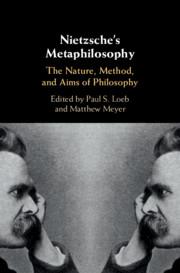Book contents
- Nietzsche’s Metaphilosophy
- Nietzsche’s Metaphilosophy
- Copyright page
- Contents
- Contributors
- Acknowledgments
- Note on Texts, Translations, and References
- Abbreviations
- Introduction
- Part I Evolving Metaphilosophies
- Part II The Nature of Philosophy
- Part III The Method of Philosophy
- Chapter 7 Nietzsche’s Affective Perspectivism as a Philosophical Methodology
- Chapter 8 Nietzsche’s Philosophical Naturalism
- Chapter 9 Nietzsche’s Moral Methodology
- Part IV The Aims of Philosophy
- Bibliography
- Index
Chapter 7 - Nietzsche’s Affective Perspectivism as a Philosophical Methodology
from Part III - The Method of Philosophy
Published online by Cambridge University Press: 24 October 2019
- Nietzsche’s Metaphilosophy
- Nietzsche’s Metaphilosophy
- Copyright page
- Contents
- Contributors
- Acknowledgments
- Note on Texts, Translations, and References
- Abbreviations
- Introduction
- Part I Evolving Metaphilosophies
- Part II The Nature of Philosophy
- Part III The Method of Philosophy
- Chapter 7 Nietzsche’s Affective Perspectivism as a Philosophical Methodology
- Chapter 8 Nietzsche’s Philosophical Naturalism
- Chapter 9 Nietzsche’s Moral Methodology
- Part IV The Aims of Philosophy
- Bibliography
- Index
Summary
Like many of Nietzsche’s striking words and phrases, “perspectivism” (“Perspektivismus”) has received a great deal of attention in the secondary literature. However, Nietzsche uses the term only once in his published and authorized manuscripts, twice in fragments from 1886 to 1887, and once in a fragment from 1888. While tantalizing, GS 354 and the three fragments from 1886 to 1888 radically underdetermine what Nietzsche could have meant by “perspectivism.” In order to shed light on Nietzsche’s perspectivism, I approach it from two angles. First, I explore some of the rhetorical tropes that Nietzsche uses to reorient his audience’s perspective. These include engaging the audience’s emotions, apostrophic address to the reader, and what I’ve elsewhere called “Nietzschean summoning.” Each of these methods tugs at the affects and values of the audience, positioning them to notice, find salient, and be disposed to act in relation to certain (aspects of) things while ignoring, finding less salient, and being disposed to neglect (aspects of) other things. This suggests that, for Nietzsche, perspectivism has less to do with cognition than the painterly metaphor of a visual perspective suggests. Second, I employ the digital humanities methodology pioneered in my recent work to further elucidate the concept of perspectivism. I argue that, for Nietzsche, perspectivism relates primarily to agents’ motivational and evaluative sets, and that it is meant to offer a methodology for achieving various epistemic goods.
- Type
- Chapter
- Information
- Nietzsche's MetaphilosophyThe Nature, Method, and Aims of Philosophy, pp. 127 - 145Publisher: Cambridge University PressPrint publication year: 2019
- 3
- Cited by

